BergerBroker.com
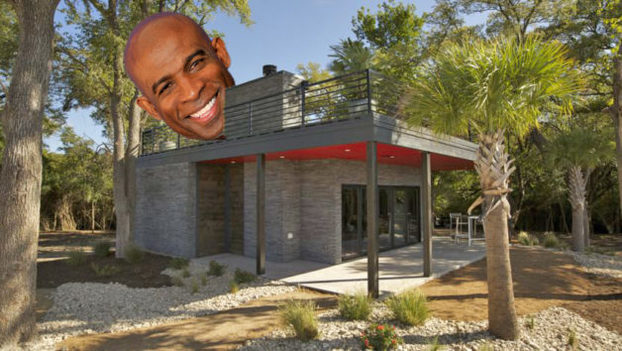 Recently, Super Bowl champion Deion Sanders sold his 29,000 square foot mansion in Dallas. It is an extraordinary home, with nine bedrooms, ten bathrooms, a 12-acre lake, football field, tennis court, indoor and outdoor pool, movie theater, bowling alley, indoor basketball court, barber shop, garage space for 14 cars, 3,000 square foot closet, and an awards gallery. Deion moved to a 7,000 square foot more understated rental house and then decided to go even smaller. “I want to go tiny because I’ve been through huge and humongous and wanting everyone to know that I’m successful, but I’m past that,” explains Sanders. “Now it’s about needs, not wants.” The NFL star is a big fan of HGTV's Tiny House Nation and hired architects to build him a luxury 600 square foot house. See the results at http://www.fyi.tv/shows/tiny-house-nation/season-4/episode-3 The success of TV shows like Tiny House Hunters, Tiny House Builders, Tiny House, Big Living, and Tiny House Nation emphasize the popularity of the micro-dwelling movement.  Why is less...more? The architectural and social movement to live a simpler life can be persuasive. Millennials think that it is financially prudent, considering college loan repayments, and it is an eco-friendly way to be debt free. The lifestyle attracts an aging population of Baby Boomers also. By 2029, nearly 71.4 million people in the United States will be at least 65 years old. For Baby Boomers who lost savings in the recession, a large home is no longer a sustainable model for retirement. They want to remain financially independent, and moving into a home with less square footage may be the answer. However, a home with fold up furniture, composting toilets, and steep staircases is laughable to most Baby Boomers. The TV show Portlandia provides a humorous view of micro-living. https://vimeo.com/151916585 Is Downsizing Depressing? Another aspect to explore is the emotional strength needed to sell and move from your home. Typically, moving is one of the major stressors in life. It is anxiety provoking when you release history. It is exhausting to unload decades of accumulated stuff. When I think of downsizing, I think about my home as the place where I've lived the longest, raised my children, established friendships, and envisioned my grandchildren playing in the backyard. But now that the nest is empty, a large home does not make economic sense. Rather than viewing it as depressing, Realtor.com analyzes four questions to determine whether downsizing is rational. Is Selling Your Home An Obstacle? For those who find that living smaller is the best option, the next challenge is selling your home. Realtors know that selling in the spring market can be competitive. In Chicagoland, the supply is low. Inventory is bound to become more plentiful as the season continues. Analysts predict mortgage rates will rise. For the best result, put your home on the market with a professional sooner rather than later. Forbes addresses the recommendation to sell with a realtor. http://www.forbes.com/2010/05/25/why-you-need-real-estate-agent-personal-finance-commission.html Is It Difficult To Buy In A Seller's Market? One expert believes that the decision to downsize will offset the economic stress a buyer sees in a competitive market. “There are opportunities for a seller-turned-buyer who wants to downsize in this market,” says Jonathan Smoke, chief economist at Realtor.com. “You can lock in financing rates that you’ll never see again, and very likely make the trade-off work.” The economic rewards should help with downsizing discomfort. Although micro-dwellings are not for everyone, the trend to downsize simplifies life and produces financial relief. 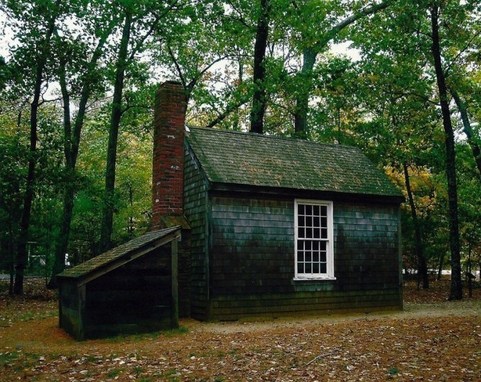 As you simplify your life, the laws of the universe will be simpler; solitude will not be solitude, poverty will not be poverty, nor weakness weakness. -Henry David Thoreau
0 Comments
Trends come and go, but which one will increase the value of your home? In 2016, one of the most widely used trends has been sliding barn doors. As much as I'm a fan of remodeler/designers and stars of Fixer Upper on HGTV Chip and Joanna Gaines, in most of our homes, a barn door just looks out of place. Yes, I know that it is space saving to use a sliding door, but pocket doors have done the trick for years. Installing barn doors with heavy duty hardware as a design statement opening into bathrooms, dens, bedrooms, and playrooms is overdone. This trend's time will pass and, as with most trends, the barn doors will have us saying, "what was I thinking?" Yet, a trend is a trend because it is embraced by the masses. Numerous trends qualify to make your home more valuable. According to BUILDER, here are the trends most homeowners demand today:
So what do you focus on when you want to add value to your home? First, know your budget when thinking about bringing your home into the 21st century. Many homeowners need less trendy and less costly upgrades. Here is a list of 10 ways to increase the price of your home: 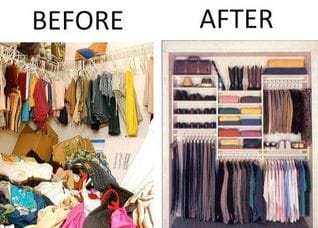 1. Clean and Declutter. No doubt a bit of power washing on the exterior and deck of your home will help buyers see that you are maintaining your home. It goes without saying that every nook and cranny needs to be free of dust, bugs, and clutter. Look at removing items from every closet, but also all those darling collectibles on open shelves, Grandma's furniture that you should have parted with long ago, or the family pictures taking up every conceivable open table or wall. Old items make your house look...well, old. If you are able to hire a professional organizer, it will make the job easier. One of my favorite people owns a business that has organized homes for years. Look at this website and treat yourself to someone who will get your home in great shape without the headaches! http://www.moreganized.net.  2. Paint. Yes, you've heard it a million times, but hearing it and doing it are completely different. You may be in love with your red dining room, but buyers will have a reaction, and you want the most positive reaction possible. It's easy to imagine the colors that will earn you a safe return on your investment. Professionals agree that it is a risk to select a paint color other than neutrals. Color trends change every year. In 2017 Pantone declared "greenery" to be the color of the year. https://www.pantone.com/color-of-the-year-2017 If you are going to use this trendy color, I suggest you use it sparingly. Why not make it less permanent and just buy a plant. Also, discover the value that paint accompishes in other ways. Refinishing furniture is a great way to change a tired look into a new and improved version. When buyers see a well-furnished home, they can imagine living there more easily. See some great examples from a friend in the business of revitalizing outdated furniture. www.facebook.com/DStressed. 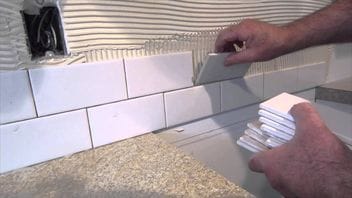 3. Backsplash. It is a simple addition to your kitchen that offers a value added punch. But be careful with the backsplash type or design. Zillow digs found that homes listed for sale with subway tile sold for 6.9 percent higher than the expected sales price. It's crazy to think that something so simple could add so much value. Clearly, this is a worthwhile update. 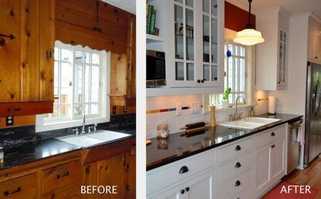 4. Kitchen Cabinets. Cabinet remodeling is a more costly update. That is true if you tear out your existing cabinets to replace them. If your cabinets are worn or antiquated in design, I recommend that you explore the cost of changing out the cabinet fronts and keeping the actual cabinet box. In the alternative, if the cabinets are in good condition and in a current design, you can refresh them by refinishing or painting them to give your kitchen a new look. Of course, replacing old cabinet hardware is important too. Again, I want to stress the design aesthetic. The refurbished cabinets need to fit into the rest of your home decor. Just think about the fact that a cabinet remodel can bring a 9.6 percent increase in your home sales price.  5. Bathroom Cabinets. Consider the same reasoning regarding a new vanity for your bathroom. Buyers are particularly sensitive to bathrooms that aren't just vintage, but obsolete. It makes sense to modernize a bathroom vanity as numerous selections exist within a reasonable budget. If any of the other fixtures are non-working, replace them. If not, the sales price will be discounted for obvious flaws, but you could also lose buyers who just don't want to deal with a bad bathroom.  6. Fireplace. Whether it is gas or wood burning, buyers covet a functioning fireplace and will pay more for a home with this focal point. Keep it in good repair and treat it to a design facelift. It will also score points with buyers when they compare homes. 7. Kitchen Appliances. If any kitchen appliances need to be replaced, you will either have to do so or give a credit to the buyers. This is certainly a higher priced category when selling your real estate, but you may find that the risk is low considering the reward. Whether you need high-end named appliances depends on the price point of your home. 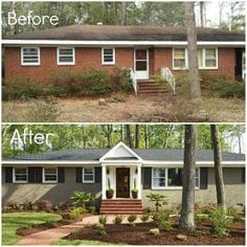 8. Landscaping. Do not forget the importance of curb appeal. Overgrown or poorly maintained landscaping has an impact on the first impression of your home. It is not necessary for you to rip out everything. It is necessary to remove anything dead. You may not have to replace the plants removed, but that depends on whether the empty space looks too open or unattractive. It may just be a relief to see the dead plants go. Trimming back bushes and trees will also serve to make your house look clean and maintained. The way you "stage" the exterior of your home can make the difference of a buyer walking in the front door or walking down the block. 9. Front Door and Exterior Lighting. One of the most obvious and neglected features of your home is your front door. It may need a fresh coat of paint or stain. It may just need to be cleaned. It is easy to make it visually appealing. Look at the lighting next to the front door. It may be as simple as replacing light bulbs, or you can bump up its appeal with new light fixtures if they are outdated. When you select outdoor lighting it is important to match the design style of your home? Imagine a colonial home or a spIit level with Prairie/Arts and Crafts style lighting. It's just...wrong. If you're selling in the winter, you still need to increase value and stage the outside of your home. If nothing else is possible, place some attractive planters next to the front door. 10. Smart Doorbell. Is there such a thing as a smart doorbell? Considering that it is relatively inexpensive, provides video and audio of people at your door, and functions as a security measure wirelessly, I'd say that's pretty smart! Statiscally, most buyers will replace the front door bell because it is often broken. Why not show your intelligence and provide the most updated door bell?
Popular trends tend to show buyers you are keeping your house up-to-date. But keeping current is costly and may not meet your needs or fit the buyers' taste. Don't risk putting in that sliding barn door just to look trendy. You may find that buyers are sick of it and are on to the next fad. I'm about to begin a much-needed update on my home. It was last renovated 22 years ago. I will keep you posted on my progress. I would love to hear about some ways you are updating your home!  "Give the ones you love the wings to fly, roots to come back, and reasons to stay." Dalai Lama As the summer comes to an end I am drawn to the many pictures posted by friends and colleagues of their children going off to elementary school, middle school and high school. It brings back so many memories of the days when being a working mom to my four kids meant intense activity with little down time and so much chaos and joy. Now that my last "baby" has left the nest, I am wondering how I will cope with my sense of loss. It is so quiet in my house that it feels strange. I should be prepared by past experience. But being prepared is only part of the challenge. In an effort to bring more positive thoughts together, I use an "embrace the empty nest" support list:
1. Use this opportunity to see how capable your children are without you 24/7. 2. Reflect on the job of motherhood and your strengths and weaknesses. 3. Keep the wonderful "nest" strong as the job is never over. 4. Recognize the value of motherly advice; they're never too old for it. 5. Know when to keep your mouth shut and let them experience college life. 6. Use the quiet time to work hard at anything and everything. 7. Connect with your suppressed inner talents. 8. Breathe deep and take care of yourself. 9. Find something greater than yourself. 10. Enjoy a new chapter of life when coming home from school may take longer, but is still filled with milk and cookies!  You've decided that you want to buy a home. You do all of your research to find the properties that seem like a good fit. You go online and search every possible website, drive through your preferred neighborhood in case you missed any houses that are for sale by owner, and devote your weekends to visiting open houses. All this work has saved you the cost of a real estate agent. But is that true? No, it is not true. If you use a real estate broker to buy your home, in most situations you are not charged a commission, and it is the agent's duty to fully represent you. Will a buyer's agent find you your dream home? No guarantees, but why would you run yourself ragged when the listings will be found for you and sent to you with your preferred criteria. Tours of the homes will be customized to save you the time and headache of seeing nightmarish places. When you sign a buyer's representation agreement, it binds the broker to you and your best interests. The agent should be able to listen to your needs and be a liaison between you and the seller's listing agent. Explaining the entire process of home buying to you will be first. But when you have narrowed your choices down to the house, the agent will make a well-reasoned offer. The offer will be formulated with the most critical component...the "comps" or the sales of comparable houses sold in the area. Without the ability to put together these numbers, you may make an offer that is not in line with what the house is worth. It's not only a matter of paying too much for the house, it may also mean that your offer is too low to reflect the market value of the house. In today's real estate market of low inventory and significant demand, the deal will not close if the purchase offer is out of line. Once the offer is determined, an agent will negotiate the price and resolve other issues so that the offer is accepted. The agent's goal is to protect you so that you do not end up with buyer's remorse. No broker's fee is too high when you buy the house of your dreams, right? Oh, never mind...it's free! For those of us with high school seniors, May 1st is decision day; the deadline to decide where they will move to begin their college education in the fall. No more waiting and wondering to see which school will see the merits of accepting our children. The results may be disappointing or elating, but the suspense is over. Now, it's crunch time. And where are we, as parents, in this process? Many of us travel through this journey with our kids, literally and figuratively. We visit more college towns than we care to count, and the tours seem to blend together. The campus guide's hyperbole suggests to us that a fabulous future awaits this final decision. As we walk through the maze of buildings to observe and listen, we make an honest attempt to figure out the best fit for our teenager. Glazed over from endlessly weighing the pros and cons, we look at valid and frivolous considerations. Having gone through this marathon four times does not make me an expert, but it does clarify my perspective. I am a sucker for the setting and ambiance of each campus...and of course, the value of real estate investments in the surrounding college town. I am not alone in the fascination of investing in college towns. It is becoming trendy. Some make the investment because they contemplate the expense of student housing for the next four years, while others simply know that college towns contain a built-in housing demand and want to capitalize on it. Whether the choice to own real estate is for the next four years, or as a long-term investment, numerous questions arise. Who is selecting the tenants? Who will maintain the property? Who will deal with repairs and how much should be budgeted for these costs? How realistic is it to be a long distance real estate investor? Sarita Harbour provides some insight on the topic of buying real estate in a college town. As she concludes, "with a desirable college neighborhood, a strong current and/or future rental market and a child with years of school ahead, investing in college properties may make financial sense." http://www.forbes.com/sites/northwesternmutual/2015/01/13/home-away-from-home-buying-real-estate-in-your-kids-college-town/#7071b92a7b39 Although I have had the pleasure of analyzing the real estate investment potential in many college towns, I will give you my top five reasons for investing in a college town that is near and dear to my heart...Evanston.  1. Location, location, location Evanston is home to Northwestern University which is arguably one of the most beautiful campuses in the Midwest. Stretching along Evanston's eastern border, Northwestern occupies some of the most valuable real estate in the city. Lake Michigan's sandy shore and all of the beaches, boating and swimming provide an exceptional setting. With magnificent historic Victorian lake view mansions to new high rises and rehabbing existing housing, the property selection is varied and in demand. The New York Times featured Evanston as a "surfacing" destination and Politico.com declared its downtown to be "increasingly hip. Anyone who spends any length of time in Evanston understands the vibe is not typical North Shore, in a good way. https://vimeo.com/149798614 2. Proximity to Chicago Evanston is no slouch when it comes to fabulous cafes and restaurants, bars and breweries, (nearly 100). More than twenty-five art galleries, museums, and concert halls create a cultural hub, but as you look South you see Chicago beckoning you to explore. If you hop on the "L", take a Metra train, or drive along Lake Shore Drive, you can be in the Windy City and all that it offers within about 30 minutes. 3. Pedestrian friendly environment The walking or biking ability to all things necessary for a balanced life is the benchmark of the Evanston lifestyle. When Evanston redeveloped its downtown, it focused on providing its residents with a quick walk to buy groceries, use a dry cleaner, watch a movie, get a spa treatment, exercise inside or outside, relax at a collection of parks, or commute by train or bus in order to reduce the need for cars. A healthier lifestyle is obvious with less congestion due to the lack of a car-centric environment. http://www.cityofevanston.org/assets/Bicycle%20Network%20Posters.pdf 4. Diversity
Although not as diverse as Chicago, one of the unique aspects of living in Evanston is its diversity, both racial and economic. City government has made an ongoing commitment to combat prejudice and strengthen the relationship between the diverse population. "Evanston continues to be a very diverse community and it is this diversity that helps define us as such a wonderful community in which to live, work and play,” said Mayor Elizabeth Tisdahl. 5. Real Estate Opportunities Evanston has seen the addition of nearly 1,200 new condominium units since 2000. Many of these buildings have retail on the ground floor and are located within a half a mile from transit stops, making it ideal for commuters who are tired of traffic nightmares. But contemporary condo buildings are by no means the only housing with investment potential. The historic quality of many of the multi-family apartment buildings and single family homes offer unique real estate opportunities in neighborhoods walkable to classes at Northwestern and beyond. For those of you that are moving forward and thinking of real estate investment potential, Evanston clearly has a steady flow of students, professors, faculty, and administrative staff needing housing. And for Baby Boomers, the National Association of Realtors has found a preference for post-retirement moves into college towns. I would like to hear your top reasons for investing in Evanston and college town real estate. Please let me know and consider BergerBroker.com for your real estate needs. No matter how many times I tried, I couldn't give up my real estate addiction. It wasn't my only need, by any means, but it was always present. Some would say that it was genetic. Neither of my parents was licensed realtors, but my father invested and my mother decorated. As a young girl growing up in the rapidly developing North Shore of Chicago, others went to the M & R movie theaters, Old Orchard, or Kiddieland, but I looked at homes--homes being built, designed, decorated, and sold.
Traveling downtown to the Merchandise Mart with its beautiful designer showrooms was an instant high. Yet, my career path took a different turn. I became a lawyer, married a lawyer, raised 4 kids, and pampered several dogs. I ended up back in the general neighborhood where I grew up, and my preoccupation with real estate never exactly dissipated. It was understood by many that I was obsessed, and some actually thought I was a realtor. I protested that in fact I was not a real estate professional, but I felt complimented, and of course it fed my real estate fix. So it is not too surprising that one-day last summer, I decided to get my license, join a company, and dive into a new venture. I am fueled by years of yearning to give into my addiction. Please meet me here to explore my next steps. |
AuthorJudi Berger is an attorney and real estate broker who is blogging as she begins a new chapter in her life. Archives
October 2019
Categories |
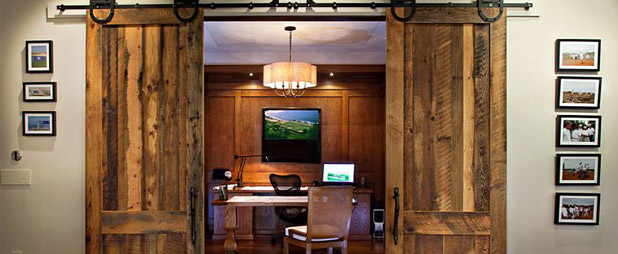


 RSS Feed
RSS Feed